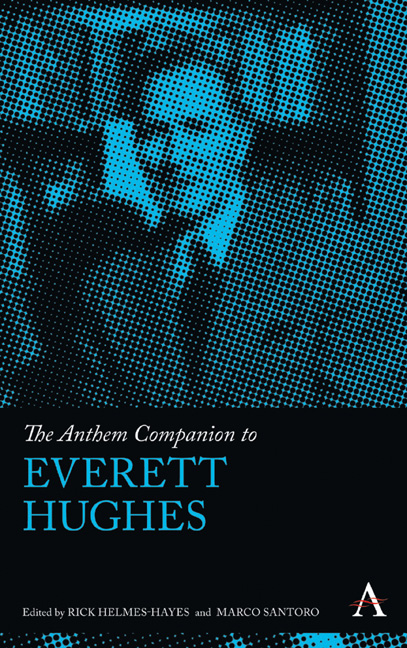Book contents
- Frontmatter
- CONTENTS
- List of Illustrations
- Foreword Everett C. Hughes, Great Teacher
- Insight through Craftsmanship: The Sociological Legacy of Everett Hughes
- Chapter One Everett Hughes and the Chicago Tradition
- Chapter Two Studying “Going Concerns”: Everett C. Hughes on Method
- Chapter Three The Natural History of Everett Cherrington Hughes: A Master of Fieldwork
- Chapter Four Everett C. Hughes: A Key Figure of the Canadian Chicago School Diaspora
- Chapter Five Everett Hughes: Notes from an Apprentice
- Chapter Six An American in Frankfurt: Everett C. Hughes's Unpublished Book on Germans after the End of the Nazi Regime
- Chapter Seven The Origins and Evolution of Everett Hughes's Concept: ‘Master Status’
- Chapter Eight Discovering the Secret of Excellence: Everett Hughes as a Source of Inspiration in Researching Creative Careers
- Chapter Nine Everett Hughes on Race: Wedded to an Antiquated Paradigm
- Notes on Contributors
- Index of Names
- Index of Subjects
Chapter Eight - Discovering the Secret of Excellence: Everett Hughes as a Source of Inspiration in Researching Creative Careers
Published online by Cambridge University Press: 17 June 2017
- Frontmatter
- CONTENTS
- List of Illustrations
- Foreword Everett C. Hughes, Great Teacher
- Insight through Craftsmanship: The Sociological Legacy of Everett Hughes
- Chapter One Everett Hughes and the Chicago Tradition
- Chapter Two Studying “Going Concerns”: Everett C. Hughes on Method
- Chapter Three The Natural History of Everett Cherrington Hughes: A Master of Fieldwork
- Chapter Four Everett C. Hughes: A Key Figure of the Canadian Chicago School Diaspora
- Chapter Five Everett Hughes: Notes from an Apprentice
- Chapter Six An American in Frankfurt: Everett C. Hughes's Unpublished Book on Germans after the End of the Nazi Regime
- Chapter Seven The Origins and Evolution of Everett Hughes's Concept: ‘Master Status’
- Chapter Eight Discovering the Secret of Excellence: Everett Hughes as a Source of Inspiration in Researching Creative Careers
- Chapter Nine Everett Hughes on Race: Wedded to an Antiquated Paradigm
- Notes on Contributors
- Index of Names
- Index of Subjects
Summary
Introduction
In this chapter I examine the lifeworlds of two elite or high-status occupations: violin virtuosos and scientists working in prestigious life-science laboratories. I do so using conceptual and methodological tools and insights developed by Everett Hughes.
One of Hughes’ key concepts is the ‘career’ (Becker and Carper 1956; Becker 1970; Hughes 1971: 283–407). For Hughes, the notion of the career, a crucial concept in the interactionist approach to the study of occupations, is a broad and flexible one. It can apply just as well to one’ career as a drug addict, patient or mother as to one’ occupation. Careers are developed/played out in the context of one’ activities as one moves in and out of various institutional contexts: skid row, hospital, family.1 Hughes’ concept of the career as a multistage process constitutes the basis for my work, described below, on the socialization and professional trajectories of elite musicians and scientists. These careers are similar to one another in the sense that they are understood to be ‘creative’. The notion of the ‘creative career’ is a relatively recent concept developed in the field of creative industry studies (Mathieu 2011). The particularity of the creative career consists in the extraordinary commitment individuals display toward their chosen occupation, more specifically, their focus on the creation of the new products or new forms of old products and their involvement in daily activities oriented to ‘innovation’. In other words, creative careers are characteristic of groups engaged in intellectual and/or artistic forms of work. Creative careers are often built inside creative industries (movie, design, arts, sciences). In both studies reported here, I followed individuals who were perceived within their respective professional environments to be part of an elite – people working among the top groups in what are widely regarded as the best places for mastering and applying their exceptional skills, that is, for demonstrating ‘excellence’. One finding of my research is that while violin virtuosi and top-level research scientists are hard-working individuals, they are developing or have developed their potential in particular social environments within which backstage actors contribute substantially to the ‘excellence’ demonstrated by elite musicians and scientists. This runs counter to the conventional understanding held by outsiders that they are exceptional individuals who possess not just excellence but, often, often, ‘genius’.
- Type
- Chapter
- Information
- The Anthem Companion to Everett Hughes , pp. 193 - 210Publisher: Anthem PressPrint publication year: 2016

